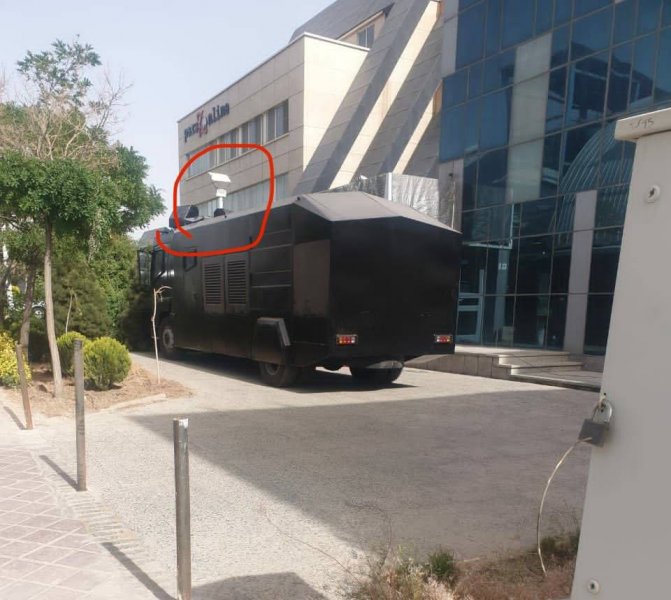All Accused of Internet Suppression in Iran
For a long time, the names of some companies and individuals accused of participating in the project to cut off the internet or technically cooperating with intelligence agencies to access individuals’ private information have been heard in Iran. One of the most famous among them is the company Abr Arvan, whose name became widely known during the week-long internet shutdown in November 2019. However, in recent days, as the internet speed in Iran has decreased again and at times has approached a complete shutdown, the names of other companies and individuals have also been mentioned.
Douran
Amir Rashidi, an IT expert, wrote on his Twitter that the team currently leading the internet suppression includes Rasoul Jalili, the head of the Infrastructure Communications Company, Isa Zarepour, the Minister of Communications, and Amir Lajvardi. He wrote that on the other hand, the company Douran is responsible for technical tasks, and part of the disruption in Iran’s internet has been carried out with the help of the Douran technical team to analyze user behavior. According to him, it is heard that they have hired dual-national individuals to evade sanctions.
Another user wrote that the Douran group and company started national filtering and then, with the firewalls they produced, forced all internal organizations to use them. He also wrote that Rasoul Jalili, a member of the Supreme Council of Cyberspace and a staunch supporter of a complete internet shutdown, is on the US sanctions list, and Isa Zarepour, the Minister of Communications, is practically a student of Rasoul Jalili, having worked with him for years at the Clean Cyberspace Development Association. Jalili is the head of a company that provides internet for all of Iran.
Sahab Pardaz
Yaser Bahrami, another user with software engineering expertise, wrote that since 2019, only Abr Arvan was targeted, but the companies Sahab Pardaz, Amn Afzar Sharif, and the Douran group have also played a significant role in filtering. In another tweet, he also wrote that it has been reported that the company Pouyesh Rayan Tasvir, operating under the brand Odin, is cooperating in equipping anti-riot vehicles to capture images of protesting people and create trouble for them.
They have labeled themselves as knowledge-based and are located in the Pardis Technology Park, Innovation Street 3. It was also said that in the case of prison camera hacks, the cameras were made by this company and they have many government clients.
A user also published an image of a 99 billion Toman contract of the Sahab Pardaz company with the Infrastructure Communications Company in 2017. The title of this contract is the creation of a comprehensive cultural and social protection system. Another user named Awat also had a detailed thread about the activities of this company and others, but later, for unknown reasons, deleted his account, making his thread inaccessible.
Reaction of the Previous Minister
Nima Akbarpour also referred to Colin Anderson’s comprehensive research, which indicates that Iranian ISPs provide their users’ information to a company active in smart filtering named Sahab Pardaz. According to another user, many data mining companies and organizations have recently become active, and their job is to collect information and data from internet service providers and telecommunications operators and deliver reports to government sections and related filtering entities.
During his tenure as Minister of Communications and Information Technology, Azari Jahromi reacted to these statements on Twitter, especially concerning Sahab Pardaz, writing that he assures that no shared private information has been given to any company and will not be given. This claim is not documented. According to the review conducted, the mentioned company does not engage in smart filtering activities for internet companies.
What Should We Do
According to an IT expert user, staying safe from these companies requires several combined methods such as:
1. Using the highest possible level of encryption for information and communications 2. Using the Tor filter circumvention tool 3. Using updated browsers and activating TLS 1.3 4. Using a personal VPN 5. Avoiding non-official and domestic apps
Reaction of the Current Minister
On September 21, videos of Isa Zarepour, the Minister of Communications, were released, in which he said that due to security issues and some discussions that exist these days, sometimes restrictions might be decided and applied by security agencies. The ministry under his leadership described this quote as incorrect a few hours later and denied the imposition of restrictions or internet shutdown.
However, the Public Relations and Information Center of the Ministry of Communications and Information Technology announced a few hours later that this quote from the minister was incorrect and denied imposing restrictions or internet shutdown.
The Public Relations Center of this ministry, quoting Isa Zarepour, corrected his statements by saying that in recent days, there have been temporary restrictions in some areas and at certain times, which have been resolved, and currently, the communication network has no problems in terms of speed and quality.
However, the reality of the internet in Iran proves the opposite of the minister’s statements, as its quality and speed have significantly declined.
- Disaster in Iran’s Economy: Internet Shutdown Causes Negative Economic Growth, Part Two
- Who Benefits from the Internet Shutdown
- A 35 trillion Toman loss from internet disruption in just one month

